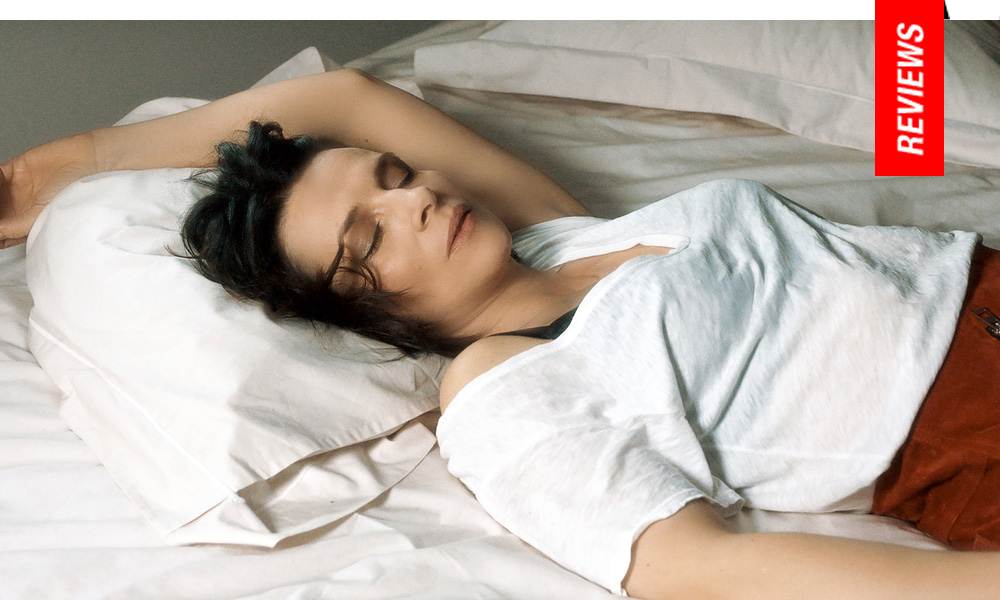Let the Sunshine In | 2017 Cannes Film Festival Review
A Tall Dark Stranger: Denis and Binoche are Remarkable Bedfellows in Light Comedy
Claire Denis comes as close as she ever will to romantic comedy territory with the wryly staged Let the Sunshine In (formerly Bright Sunshine In) starring an effervescent Juliette Binoche as a woman who becomes increasingly obsessed with finding love but chronically searching in all the wrong places. Denis was inspired by Roland Barthes’ A Lover’s Discourse as a vehicle for Binoche. Retooling it with novelist Christine Angot, they morph it into a slender thread of revolving sexual and romantic vignettes a middle aged artist experiences. Although there’s certainly never been any doubt as to the range of La Binoche, the performer shoulders the entire fragile frame of the narrative with stunning aplomb, walking a fine line between relatability and unhinged desperado of amour fou.
Divorced, but not particularly liberated by the experience, artist Isabelle (Binoche) suffers through a string of tawdry trysts which she fools herself into believing are actual romances. From a sexually aggressive married banker (Xavier Beauvois) to a timid yet handsome married actor (Nicholas Duvauchelle), Isabelle knows being the other woman won’t really get her anywhere. Yet options abound, such as a creepy admirer at her local fish market, and eventually a romance with a working class citizen which her jet-setting friends visibly balk at.
Those familiar with Denis will most likely categorize Let the Sunshine In as one of her fluffier pieces, more along the lines of 2002’s Friday Night. More often than not, she prizes characterizations of dark, brooding, troubled types, from the Isabelle Huppert headlined White Material (2009) to the vampiric lovers on the lam of the phenomenal Trouble Every Day (2001). And through it all, Denis usually features Alex Descas, who is on hand for one of Binoche’s minor flings. But what a ways we are from the monstrous depravities of Denis’ last venture, 2013’s incest sex abuse drama Bastards, and the comparison only confirms its director’s own pronounced talents for stamping each genre or outlet with her particular swagger.
We open on Binoche in rather unappealing coitus with a meaty and (as we come to confirm) repugnant married banker played by Xavier Beauvois. Desperately, he wants her to reach orgasm, which is made immediately clear to be an impossibility. Little by little we surmise the extent of their relationship, tempered by bizarre interactions, like Beauvois’ strange harassment of a bartender over drinks where he mentions he’ll never leave his wife while freely grappling his mistress’ genitals.
Next up, a loquacious stage actor played by Nicholas Duvauchelle (who was also in White Material), married and equally awkward in his moves to bed Binoche. The droll tone soon takes on more despairing dimensions as Binoche’s Isabelle confirms her sincerity in the search for love. Her apartment has telltale signs of her inner dimensions, such as a poster of Liz Taylor in that famed seductive pose from Cat on a Hot Tin Roof, and a prominently displayed record of Ella Fitzgerald, while the crooning of Etta James leads to a romance with a racial other, and a startling reveal on her character’s elitist tendencies and flair for self-sabotage (likewise, it recalls a favored pose for Binoche as she lets loose on the dance floor, such as in Sylvie Testud’s little seen 2012 film Another Woman’s Life wherein a performance to Blondie’s “Maria” makes a lasting impression). And, perhaps best of all, Denis casts Gerard Depardieu and Valerie Bruni-Tedeschi in cameos which enhance the finale’s marvelous slow-roll through the credits.
Effervescently calibrated, Let the Sunshine In drinks Binoche in at every frame, and DP Agnes Godard positions her in tight close-ups which not only accentuate her beauty, but a myriad of emotions ranging from boredom to raging, throbbing insecurity.
Reviewed on May 18th at the 2017 Cannes Film Festival – Directors’ Fortnight Opening Film. 94 Mins.
★★★★/☆☆☆☆☆
Los Angeles based Nicholas Bell is IONCINEMA.com's Chief Film Critic and covers film festivals such as Sundance, Berlin, Cannes and TIFF. He is part of the critic groups on Rotten Tomatoes, The Los Angeles Film Critics Association (LAFCA), the Online Film Critics Society (OFCS) and GALECA. His top 3 for 2021: France (Bruno Dumont), Passing (Rebecca Hall) and Nightmare Alley (Guillermo Del Toro). He was a jury member at the 2019 Cleveland International Film Festival.
























